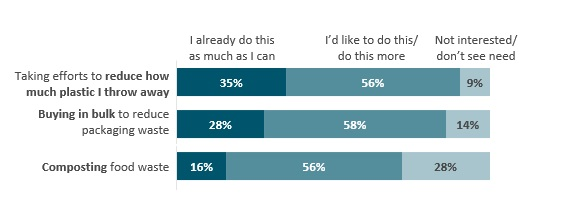
Food waste, and a related topic, upcycled CPG products made from formerly discarded food ingredients, are both trending news in the midst of a pandemic if only because from the consumer perspective, wasting food is even more onerous today than it was prior to the effects of COVID-19.
CPG brands are listening: As we noted in our recent podcast about Superbowl 2021 food and beverage advertising, and as profiled in a marketingdive.com article, “Hellmann's will make its first Super Bowl appearance with a commercial providing tips on how to avoid wasting food at home. The Unilever mayonnaise brand plans to air a 30-second spot starring comedian Amy Schumer, who urges people to "make taste, not waste."
The Hellman’s ad is all part of Unilever’s increasing focus on sustainability themes and is in step with consumers, who were already concerned about waste in general prior to the pandemic: While our sustainability studies have demonstrated increasing efforts and aspirations to thwart many kinds of waste (including plastic, packaging and food waste - Figure 1), we saw at the onset of the pandemic that
Figure 1: Waste and Sustainability Actions Consumers Say They Act Upon or Aspire To
Source: Sustainability 2019: Beyond Business as Usual report, The Hartman Group, Inc.
the cultural focus on food waste in the home sharpened, evidenced in tracking studies conducted by The Hartman Group for FMI — The Food Industry Association in Spring 2020.
This research found that Americans were developing new cooking and thrift habits, among which included beliefs that 36% thought they’d be more successful in avoiding food waste than prior to the pandemic. When asked to look forward, in the same research 51% said they even imagined themselves in a COVID-free future as “wasting less food” (Figure 2).
(Figure 2): New Cooking Habits Americans Developed During COVID-19
Source: FMI’s U.S. Grocery Shopper Trends COVID-19 Tracker – June 2020 Infographic
In May 2020, the UFA released its definition for ‘upcycled food,’ which it sees as “ingredients that otherwise would not have gone to human consumption, are procured and produced using verifiable supply chains, and have a positive impact on the environment." Establishing certification standards was the next step to build consistency and bring clarity to the market.
On the closely related topic of upcycling wasted food ingredients, trends abound in terms of both schemes for certifications as well as new products boasting upcycled ingredients. The Upcycled Food Association (UFA), as part of advancing its long-term vision to ensure “all food is elevated to its highest and best use” published its first certification standard in 2020 and is developing a food label for certified products.
In terms of emerging brands, innovations in upcycled food and beverage products have significantly grown in recent years as a way for producers and manufacturers to add value to byproducts and surplus ingredients that might otherwise have been spoiled. The UFA boasts over 100 companies in its membership, and food companies such as Planetarians, Philabundance, and Treasure8 are safely repurposing ingredients into new product developments.
Coffee flour, a product of the Coffee Cherry Company, is a branded ingredient crafted from the typically discarded outer “cherry” of coffee beans, and is another example of upcycled food products. We profiled the Coffee Cherry brand prior to it’s name change in an interview for this newsletter in 2018: Coffee Flour: Emerging Ingredient Shows Potential as Sustainable “Future Food”.
Looking Forward on Food Waste and Upcyling:
According to the USDA, between 30% and 40% of the food supply becomes waste in the United States. As a significant portion of greenhouse gas emissions come from food waste, upcycled food certification standards will signal to consumers that a product contains a meaningful amount of truly repurposed ingredients, offering an opportunity for them to participate in tackling climate change.
In terms of food waste itself, driven by changes seen both in their own lives and in their communities, consumers are increasingly thinking about how food waste occurs throughout the product lifecycle: For them, the pandemic has illuminated the interconnectedness of the food supply chain, with crippling effects visible not only among shuttered businesses, but within a wider, interdependent network of consumers, farmers, and other institutions.
COVID-19 has also put a spotlight on food waste and thrift at home. The question “Will my family actually use this item?” has taken on greater meaning as consumers have been forced to adapt to both fewer, constrained sourcing routines and more intentional strategies about when and how they will use items.
As consumers continue to raise expectations for products and companies to do better, they are primed to more greatly value product attributes, practices and narratives that shed light on corporate initiatives relating to responsible resource use.
Upcoming Study: Sustainability & Transparency 2021
Interested in learning more about Hartman Group research on sustainability? In the third quarter of 2021 we will launch Sustainability & Transparency 2021. Building onto prior findings in The Hartman Group’s foundational Sustainability syndicated series, the 2021 study will both provide an update on ongoing trends and examine new sustainability-related considerations that have become important to consumers. It will provide food companies, retailers, and restaurants with key insights into what consumers are looking for now, what issues are emerging, and how they interplay with other priorities to allow consumers to fulfill their food journeys as well as live their values.
To learn more about our syndicated research for 2021 and how to sign up early to take advantage of special pricing, contact: melissa@hartman-group.com

